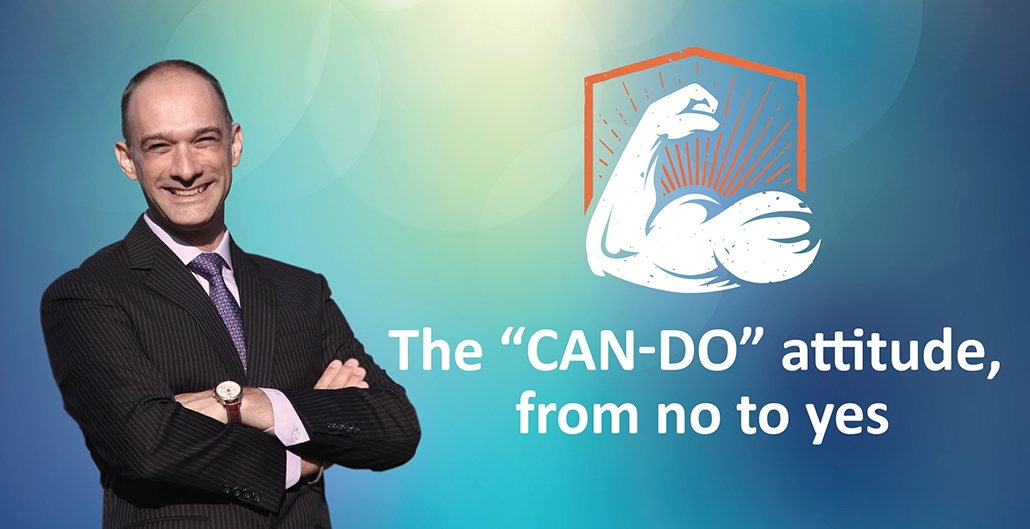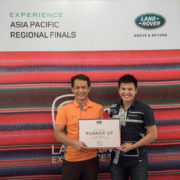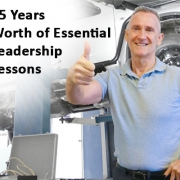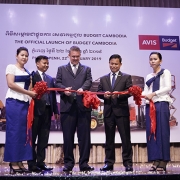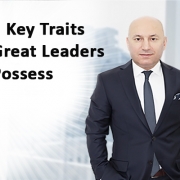The “CAN-DO” attitude, from no to yes
By Jean-Boris Roux, Vice President Food Services, EFG
The business world is getting increasingly complex, and more so as times are uncertain, economies volatile, markets disrupted and budgets under pressure. Confronted to an ever growing number of challenges, leaders are compelled to develop their skills and endurance in order to succeed sustainably.
One of the most efficient skills I have witnessed during my career is one that is referred to as the œcan-do attitude. More than just a mind-set, the œcan-do attitude is one of the most powerful assets leaders can draw on and it becomes a formidable weapon to face struggles and overcome obstacles. œCan and œdo : two self-explanatory words which refer to belief and self-confidence as well as execution and performance. Both ideas are entangled and bound up together, like a recipe in which optimism, perseverance, resilience and capacity to deliver are the ingredients. Procrastination and negativity are persona non grata in this landscape.
A œcan-do attitude carries an intrinsic value of positivity. Positive people focus on success. They tackle mental roadblocks, aim high and are not afraid to stretch themselves. In the late 80s, the French giant retailer Carrefour built its reputation with a simple slogan œavec Carrefour, je positive ( œwith Carrefour, I positive – a French neologism used to express positive thinking) and successfully revived the campaign in 2010 to cheer up depressed consumers. Following the same path, Coca-Cola promoted positivity and happiness in its 2013 award winning campaign œreason to believe . The message is set: everything is possible to those who believe. Obstacles will get in the way but hardship is meant to challenge, not to stop.
Yet, be warned œcan-do does not stand for blind optimism and naive positivity. œCan-doers are not only determined, they are also conscious. They are no stranger to the Stockdale paradox described by Jim Collins[i] as a balance between the ability to realistically assess the challenges faced and an invincible faith in a positive outlook (reference to Vice-Admiral James Stockdale who survived over 7 years in captivity during the Vietnam War). Indeed, awareness is key. œKnow-can-do is a less catchy expression, yet it captures the importance of risks understanding and knowledge of surroundings. Political leaders from all sides are countless examples of this balance. The 2008 US Democrat campaign slogan œYes we can! , although initially considered too corny by Barack Obama, eventually became a testimony to what a œcan-do attitude is able to achieve.
So, if success is indeed inevitable, why aren’t all leaders œcan-doers ? I reckon one of the root causes of this deficit relies in the fact such leaders are required to leave their comfort zone, to put themselves at risk, to test their willpower. Unlike the Roman and Greek Stoic philosophers who were practicing voluntary discomfort, most people are up to the challenge. It takes strong willpower to take risks. Fortunately, such characters do exist. My own grand-mother, Germaine de Vaucresson, organized and led my grand-father’s escape from a prisoner-of-war camp where he was held in the East of France during World War II. There is no doubt the risks were colossal but her willpower was even more colossal. More than 50 years later, driven by the same spirited willpower, she started learning computer skills at age 90 and went on writing her memoires, now an important piece of my home library. At the twilight of her life, my grand-mother was still leaving her comfort zone, teaching me a life lesson I have never forgotten.
In Thailand, one particular businessman resonates with the compelling example of the œcan-do attitude: William Heineke, CEO and chairman of Minor International. Entrepreneur since the age of 17, he developed an impressive track record of successful ventures before facing his fiercest challenge in 2001 in what is now known as the Pizza War[ii], episode which brought him to defy US food & beverage leader Tricon[iii]. Risking losing the business and leadership position he had been building for 20 years with Pizza Hut, Bill Heineke took on the challenge of creating his own pizza brand in 45 days. As of today, The Pizza Company remains the No 1 pizza & pasta restaurant chain in Thailand. This wouldn’t have been possible without the relentless œcan-do spirit the businessman and his 4,000 staff demonstrated throughout this crisis, proving experts’, media’s and competitors’ gloomy predictions wrong.
Perhaps the first step to developing such an attitude is to cut off negative thoughts, stay away from the energy vampires[iv] surrounding us and focus on HOW we can make things happen as opposed to WHY we think we can’t succeed. By doing so, we unleash ideas and opportunities. Where others give up, can-doers try harder. Where others fear, can-doers hope. Where others doubt, can-doers believe and reassure. Whether you want to grow your business, lose weight or pass an exam, a œcan-do attitude will undoubtedly take you further than anyone else.
Notes:
[i] Jim Collins – œGood to Great
[ii] William E. Heineke – œThe Entrepreneur, 25 golden rules for the global business manager
[iii] Tricon changed its name into Yum!Brands in 2002
[iv] Jon Gordon – œThe Energy Bus

